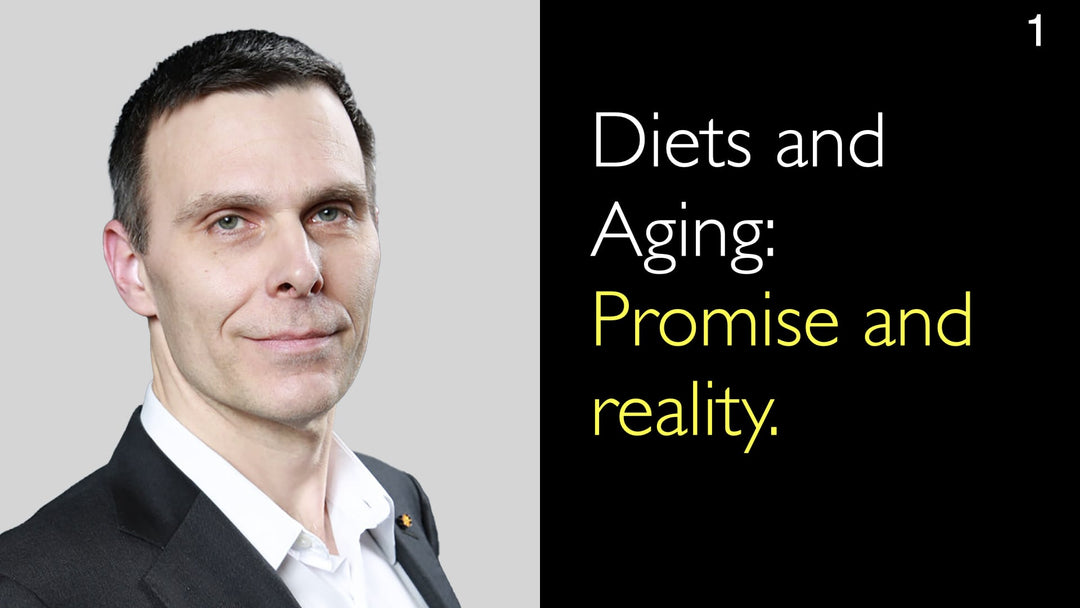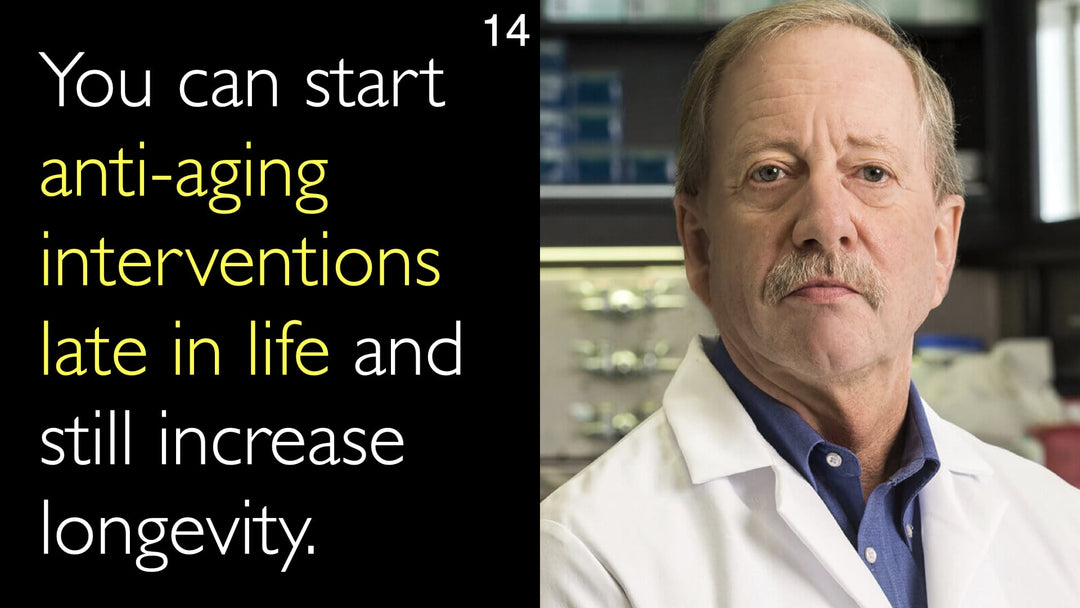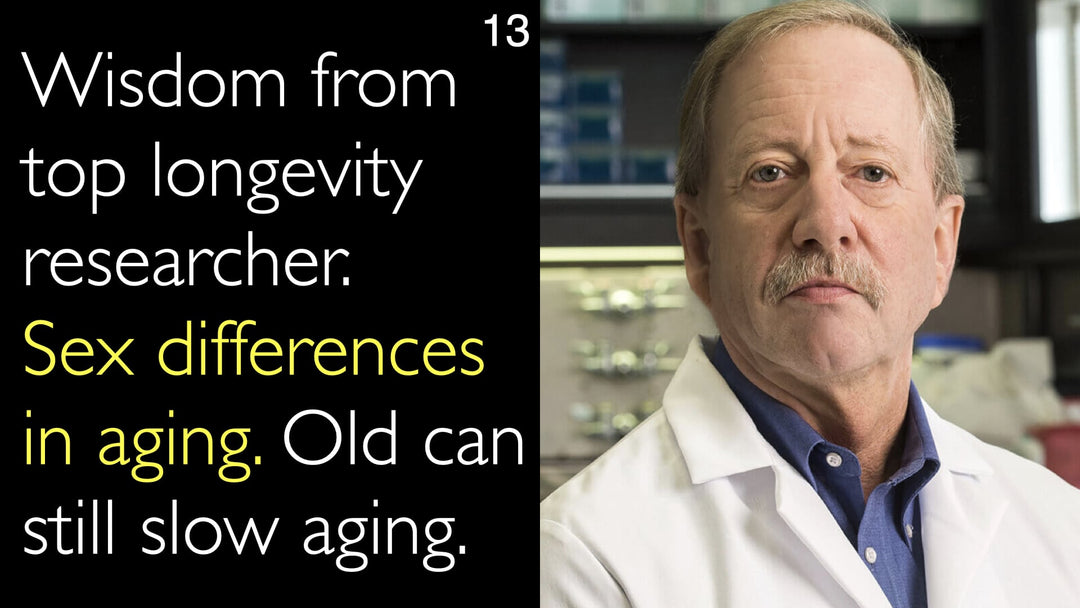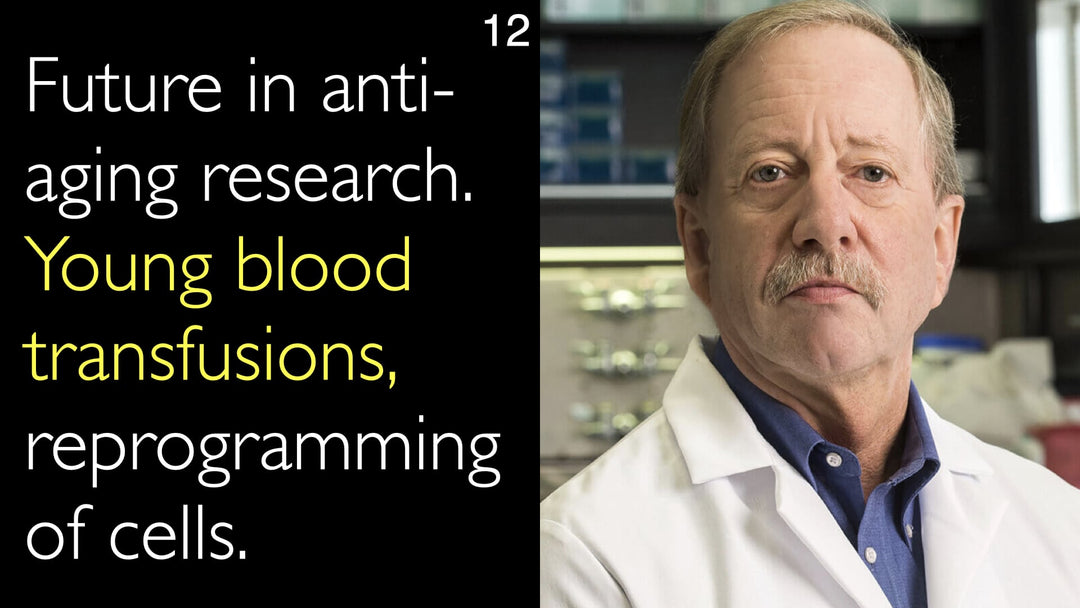Dr. Matt Kaeberlein, MD, PhD, ein führender Experte für Altersbiologie, erläutert, wie die Ernährung den biologischen Alterungsprozess maßgeblich beeinflusst. Er beschreibt die nachgewiesenen Effekte von Kalorienrestriktion in Tiermodellen und diskutiert alternative Ernährungsstrategien wie ketogene Diäten und Intervallfasten. Abschließend beleuchtet er die derzeitige Lücke zwischen vielversprechenden präklinischen Daten und fundierten Ernährungsempfehlungen für die menschliche Langlebigkeit.
Ernährungsinterventionen für gesundes Altern: Von der Kalorienrestriktion zur Anwendung beim Menschen
Direktnavigation
- Einfluss der Ernährung auf das biologische Altern
- Effekte der Kalorienrestriktion
- Alternative Ernährungsstrategien
- Evidenz beim menschlichen Altern
- Ernährungsempfehlungen für Langlebigkeit
- Vollständiges Transkript
Einfluss der Ernährung auf das biologische Altern
Dr. Matt Kaeberlein, MD, PhD, leitet die Diskussion mit einem Hinweis auf den tiefgreifenden Zusammenhang zwischen Ernährung und dem biologischen Alterungsprozess ein. Er erläutert, dass präklinische Studien an Labortieren, insbesondere Nagetieren, diesen Zusammenhang eindeutig belegen. Dr. Kaeberlein betont, dass Ernährungsinterventionen sowohl die Lebensdauer als auch die Gesundheitspanne – die Lebensphase in guter Gesundheit – signifikant beeinflussen können.
Effekte der Kalorienrestriktion
Das klassische Beispiel für den Ernährungseinfluss auf das Altern ist die Kalorienrestriktion. Dr. Matt Kaeberlein, MD, PhD, weist darauf hin, dass diese Intervention seit den 1930er Jahren bekannt ist und die Lebensdauer von Nagetieren signifikant erhöht. Er betont, dass zahlreiche Studien im 20. Jahrhundert belegt haben, dass Kalorienrestriktion nicht nur die Lebensdauer verlängert, sondern auch funktionelle Abbauprozesse des Alterns breit verzögert. Dr. Anton Titov, MD, diskutiert mit Dr. Kaeberlein die zugrundeliegenden Mechanismen dieser Effekte.
Alternative Ernährungsstrategien
Dr. Matt Kaeberlein, MD, PhD, erörtert das aktuelle Interesse an alternativen Ernährungsansätzen zum Altern. Dazu gehören ketogene Diäten, Proteinrestriktion sowie zeitlich begrenzte Nahrungsaufnahme oder Intervallfasten. Er erklärt, dass Forscher versuchen zu verstehen, inwieweit diese Interventionen die Effekte der Kalorienrestriktion bei Labortieren nachahmen können. Dr. Kaeberlein beschreibt die aktuelle Evidenzlage als "durchwachsen" und merkt an, dass keine dieser Alternativen vergleichbare Wirkungen wie die traditionelle Kalorienrestriktion zeigt.
Evidenz beim menschlichen Altern
Das Gespräch mit Dr. Anton Titov, MD, wendet sich der Anwendung dieser Ernährungsstrategien beim Menschen zu. Dr. Matt Kaeberlein, MD, PhD, räumt ein, dass es korrelative epidemiologische Evidenz gibt, dass Bevölkerungsgruppen mit geringerer Nahrungsaufnahme höhere Lebenserwartungen haben. Er führt die Okinawaner in Japan als klassisches Beispiel für dieses Phänomen an. Dr. Kaeberlein präzisiert jedoch, dass unklar bleibt, inwieweit dies über Effekte auf das biologische Altern vermittelt wird – ein Gebiet aktiver Forschung.
Ernährungsempfehlungen für Langlebigkeit
Dr. Matt Kaeberlein, MD, PhD, liefert eine realistische Einschätzung aktueller Ernährungsempfehlungen für gesundes Altern. Er stellt fest, dass Ernährung zwar eindeutig die Alternsbiologie beeinflusst, wir jedoch noch weit davon entfernt sind, konkrete starke Empfehlungen auszusprechen. Dr. Kaeberlein gibt allgemeine Ratschläge und merkt an, dass Nicht-Übergewichtigkeit oder Adipositas klar mit besseren Gesundheitsergebnissen im Alter assoziiert ist. Er schlussfolgert, dass die spezifische Strategie zur Erreichung eines gesunden Gewichts – ob Proteinrestriktion, ketogene Diät oder Intervallfasten – eine offene Frage für die künftige Forschung bleibt.
Vollständiges Transkript
Dr. Anton Titov, MD: Beginnen wir mit zwei Schlagwörtern: Altern und Ernährung, Ernährung und Altern. Was verspricht die Forschung? Wo liegen die Fallstricke? Und wie sieht die Realität der Zusammenhänge zwischen Altern und Ernährung aus?
Dr. Matt Kaeberlein, MD: Gewiss. Aus präklinischen Studien an Labortieren, insbesondere Nagetieren wie Mäusen und Ratten, haben wir gelernt, dass Ernährung tiefgreifende Effekte auf den biologischen Alterungsprozess, die Lebensdauer und die Gesundheitspanne im Alter haben kann.
Das klassische Beispiel ist die Kalorienrestriktion, die seit den 1930er Jahren bekannt ist und die Lebensdauer von Nagetieren signifikant erhöht. Zahlreiche Studien im 20. Jahrhundert haben eindeutig belegt, dass Kalorienrestriktion nicht nur die Lebensdauer verlängert, sondern auch funktionelle Abbauprozesse des Alterns breit verzögert.
In jüngster Zeit besteht großes Interesse an alternativen Ernährungsstrategien wie ketogener Diät, Proteinrestriktion oder zeitlich begrenzter Nahrungsaufnahme und Intervallfasten. Wir versuchen zu verstehen, inwieweit diese alternativen Ernährungsinterventionen einige Effekte der Kalorienrestriktion bei Labortieren nachahmen können.
Ich würde sagen, die Evidenzlage ist derzeit durchwachsen. Keine der Alternativen zur Kalorienrestriktion zeigt vergleichbare Effektstärken. Es gibt jedoch durchaus Hinweise, dass einige dieser alternativen Ernährungsstrategien positive Effekte auf gesundes Altern haben können.
Es handelt sich also um ein aktives Forschungsgebiet. Wir haben viel über die Mechanismen gelernt, die der Kalorienrestriktion und einigen anderen Ernährungsinterventionen bei Labortieren zugrunde liegen.
Ich würde sagen, wir sind noch weit davon entfernt, bewerten zu können, inwieweit Kalorienrestriktion oder einige dieser alternativen Ernährungsstrategien den Alterungsprozess beim Menschen beeinflussen würden.
Es gibt sicherlich korrelative epidemiologische Evidenz, dass Bevölkerungsgruppen mit geringerer Nahrungsaufnahme höhere Lebenserwartungen haben. Die Okinawaner in Japan sind ein klassisches Beispiel dafür.
Inwieweit dies über Effekte auf das biologische Altern vermittelt wird, bleibt unklar. Dies ist ein Gebiet aktiver Forschung.
Ich würde also sagen: Es ist klar, dass Ernährung die Biologie des Alterns beeinflusst. Wir verstehen diese Mechanismen bis zu einem gewissen Grad, aber wir sind noch weit davon entfernt, Menschen konkrete starke Empfehlungen zu spezifischen Ernährungsstrategien für maximale gesunde Langlebigkeit geben zu können.
Nach alledem sind Verallgemeinerungen sicherlich gerechtfertigt. Nicht übergewichtig oder adipös zu sein, ist klar mit besseren Gesundheitsergebnissen im Alter assoziiert.
Aber die spezifische Strategie zur Erreichung dieses Ziels – ob Proteinrestriktion, ketogene Diät oder Intervallfasten – und ob eine davon den anderen überlegen ist, bleibt eine wirklich offene Frage.







